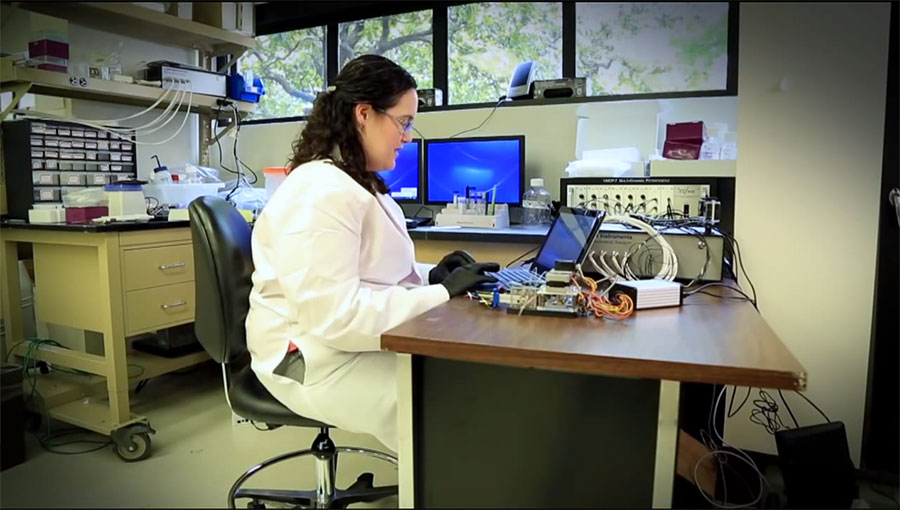Tissue Chip Testing Centers
Contact
In October 2016, we announced approximately $6 million in fiscal year 2016 for three awards for Tissue Chip Testing Centers (TCTCs) as part of the Tissue Chip for Drug Screening program. Funded through the Cures Acceleration Network, the goals for the TCTCs included:
- Providing the means for scientists funded by NCATS’ Tissue Chip program to test and validate tissue chip platforms independently
- Ensuring wide-ranging availability of tissue chip technology, particularly for regulatory agencies and pharmaceutical companies
- Promoting adoption of this technology by the broad research community.
TCTCs were designed with the necessary infrastructure, data management and statistical capabilities to accomplish these goals. Learn more about each of the TCTCs:

Vanderbilt University researcher Jennifer McKenzie works on a neurovascular-unit-on-a-chip in the lab. (Vanderbilt University Photo)
NCATS-funded TCTC scientists used a reference set of validation compounds vetted by pharmaceutical representatives through an NCATS partnership with the IQ Consortium and the U.S. Food and Drug Administration (FDA) and ran tests to determine functionality, reproducibility, robustness and reliability in these organ platforms. The TCTC scientists coordinated activities between Tissue Chip program–funded investigators and the FDA to support the progress of these chips, with the goal of getting chips to be used widely as a validated research tool and qualified for use in preclinical drug testing.
TCTC staff worked directly with the Tissue Chip Consortium — which included tissue chip technology developers, government officials and industry representatives — to test tissue chip devices; acquire, store and use standard tissue chip resources; test compounds for device validation; and share the data and methodologies with the consortium.
In collaboration with stakeholders and regulatory agencies, organ chip testing done by the TCTCs continues to help determine how the technology can be used as a better predictive model for assessing the safety and efficacy of promising therapies than current cell and animal models.
In anticipation of the end of the project period in 2021, the TCTC teams were tasked with becoming financially independent and self-sustaining. In response, scientists from the Massachusetts Institute of Technology group established Javelin Biotech, a venture-backed company focused on tissue model work for predictive drug discovery. In addition, scientists from the Texas A&M University group formed the Texas A&M Tissue Chip Validation (TEX-VAL) Consortium, through which they promote the use of tissue chips by industry and regulatory bodies. By establishing self-sustaining programs and revenue streams to replace NCATS support, TCTC scientists can continue to be fruitful and productive long after completion of the TCTC awards’ project periods.


